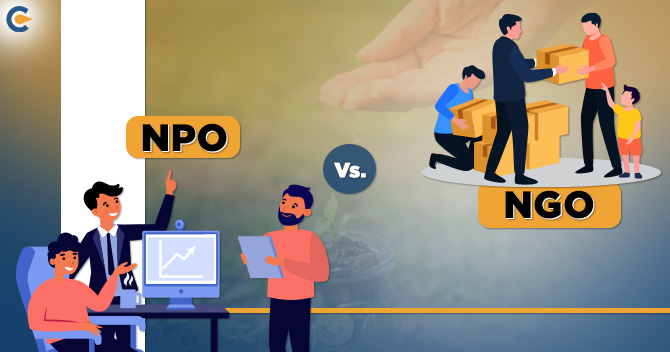Both NGOs and NPOs work for public and society welfare. They are staffed with a team of volunteers that works rigorously for the betterment of society and human lives. Such firms work without government intervention and focus on facilitating support to those who require the most. Despite their similar structure and design, there are some minute differences between NGO and a non-profit organization that we will discuss in this article.
Difference between an NGO and a non-profit organization


The differences between an NGO and a non-profit organization are given below by stating each on a detailed underline:-
Read our article:Guide on NGO Registration: Types and Benefits
What is NGO?
NGO stands for Non-Government Organization, which refers to a group of volunteers working in the direction of public and society welfare. NGO usually performs a wide array of services and humanitarian functions. The government does not intervene in the NGO’s work, allowing them to operate seamlessly without any legal constraints. NGOs are free from profit-making activities.
Their primary objective is to render appropriate aid to the unprivileged strata of society. You can find several NGOs operating at a different level depending on reach and goals. NGO can be established as a trust, society, and a company. NGOs usually accumulate their finances from government authorities, individuals, and corporates to fuel their ongoing operations or projected initiatives.
NGO performs a number of tasks to motivate the government to take necessary measures towards the citizen’s grievances, encourage political participation, and advocate policies that favor the public. The majority of the NGOs primarily look after human rights and environmental issues.
Their focus is to obliterate any grievances from these respective areas through a proactive and transparent approach. Red Cross Society, ICC, and ISO are some of the few renowned NGOs that work for a specific cause on an international platform.
What is NPO?
NPO stands for Non-Profit organization, which is a task-oriented entity, driven by a group of persons that encourages professionals, cultural, social, and religious objectives. Trustees and members of the NPO procure the initial funds for the organization to serve specific purposes. Since NPO is a non-profit entity, it allocates the surplus fund to promote its objective rather than distribute it to the firm’s members.
NPOs are incorporated under section 8 of the Companies Act[1]. Although NPO’s establishment revolves around some government’s rules, it is free to operate in an environment that discourages tax liabilities and legal constraints.
Charitable organizations, social or recreational organizations, Sports clubs, and public hospitals are the few examples of the NPO. NGOs usually target a more extensive section of society or groups of people seeking help compared to non-profit firms. NPO perform endless tasks to ensure the social and economic well-being of the specific area.
NPO suffers from a cash shortage that usually comes in the form of donations. The inconsistency in the cash flow could lead to the closure of the establishment. To counter this complexity, NPOs try out alternative funding sources and even get involved with fundraising activities such as merchandise sales and private investment. Meanwhile, NGOs have a different approach in this context. They usually accumulate their fund through crowdfunding, fundraising programs, loan financing, giving circles, and investment.
NGO and a non-profit organization: Critical Points for Differences
- NPO objectively works to promote science, art, commerce, and research, whereas NGOs strive to cure the compromised strata of society.
- NPOs are registered under section 8 of the Companies Act, 2013. Meanwhile, NGO registered under the Public Trust Act, or as a Societies Registration Act, 1860, or as a non-profit firm under the Companies Act, 2013.
- The area of operation of the NPO is limited, whereas NGOs work at a much larger scale.
- Any government regulation does not intervene in NGO and NPO operations.
- The scope of operation of an NPO is relatively smaller than NGO.
- The funds raised by NGO and NPO cannot be spent on personal expenses.
- NPO and NGOs were unable to streamline the funding process, which deteriorates their profile over time. To counter that, some more prominent non-profit firm has implemented an in-house monitoring team to ensure transparency.
- NGO refers to as Non-government organization driven by the pool of volunteers serving the common goal i:e helping poor, providing basic amenities, and releasing relief funds for victims of the natural disasters.
- NPO renders a limited landscape of the services for the betterment of the fields such as science, religions, animal cruelty prevention, and public safety testing.
- NPO qualifies for tax-exempt status as per Income Tax guidelines. It helps the NPO to underpin ongoing programs and initiatives.
- Keeping credibility and reputation in view, NPO doesn’t participate in any sort of political campaign. It helps them to leverage the transparency of their work.
- A minimum of two members (aka trustees) can lay the foundation of NPO. Keep in mind that there is no limitation on the upper limit of the members.
- NPO is not liable to serve a purpose other than promoting science, literature, and fine arts.
- Being a section 8 establishment, NPO’s members are required to constitute their firm’s existence and operation in Memorandum of article and Article of association.
- NPO doesn’t need to address heavy taxations, provided they have better control over the in-house expenses.
- Although NGO and NPO are free to work in a liberal environment, they often come under the scrutiny of the concerned authorities due to unethical practices.
Conclusion
NPO and NGO are the two different entities that may or may not serve identical purposes. They also differ on several grounds, such as operation mode, fundraising sources, and legal compliance for NGOs. Both entities could be incorporated voluntarily by the group of members by the following prescribed bylaws. Also, NPO and NGO don’t need to cater to severe tax penalties provided the cash inflow stay within the organization and used for the specified purposes.
Read our article:How to change the name of the NGO?











